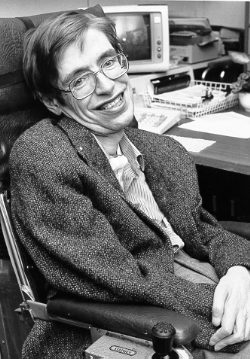Prop Head Reads: The Martian And A Brief History Of Time
Prop Head Reads: The Martian And A Brief History Of Time

(You can view my non-prop-head book thoughts here)
The Martian
by Andy Weir
(The Martian started as a personal blog writing project for Weir and its evolution from blog to book to a soon-to-be movie starring Matt Damon is a great story in itself.)
You know the scene in Apollo 13 where a bunch of engineers at NASA are locked in a room with a box of the supplies available to the astronauts and have 7 hours to figure out how to fix the filter or the astronauts die?
Well, there are generally two kinds of people. Those who have no connection to to the scene except a vague memory of it and those who think that scene is the best part of the movie.
If you’re in the latter camp, you will love this book.
Engineers and scientists usually don’t make for great novel heroes. To make them exciting, they get a Hollywood makeover and a flying tin suit that shoots lasers. And a supermodel girlfriend. But this book does the engineer hero justice: Showing off our hero’s wits (stranded alone on Mars) and those of the people back on Earth trying to help him stay alive.
The Martian (Mark Watney) approaches each of his many challenges with an engineer’s ingenuity and even if you can’t follow all the science, you’ll appreciate his mind and attitude. If his unfailing problem solving seems a little hard to believe at times, watch an action hero dodge automatic weapon fire in an action movie and tell me which is the greater exaggeration.
A gripping original.

A Brief History of Time
by Stephen Hawking
This was my 3rd attempt at this book. I finished it this time. I have to ask myself on your behalf, dear reader, “Why would you give 5 stars to a book that you could barely comprehend and could not finish 2 other times?” First, I’ll start from the premise that I have to take on some faith: Hawking knows what he’s talking about. Working from that premise, I felt reassured and on comfortable ground as he reviewed quantum mechanics, the uncertainty principle, strong and weak forces, and lots of the Einsteinian stuff that it has taken me years to absorb (and that I was better at when I could do all the math).
Second, building from those premises that I am comfortable with, Hawking helped me move the ball forward on the idea of multidimensional space, the event horizon (I finally get this, thanks to Hawking), the concept of time and the Big Bang, the stability of the universe, and the time arrows he discusses towards the end.
But man, there’s some stuff that still escapes me, all these years after first studying them even when I still had the big math muscles. (1) There’s much around black holes I still don’t get. Hawking is the Mr. Miyagi of black holes in the physics world but he can talk all day about spherical black holes, spinning black holes, etc., and whoosh, right over my head. (2) The idea of imaginary time and the sum of histories. I understand the latter a little bit mostly because I remember the math that describes them that made the universe explicable, but conceptually outside the math I really don’t grasp these even a little. (3) Really, again I have to deal with virtual particles and spins? Whoosh again.
This book is not for the faint of heart. If you want a shorter and more accessible trip through physics, try Feynman’s Six Easy Pieces and Six Not So Easy Pieces books. Both are incredible and not as dense. The former explores Newtonian physics (anyone can get those concepts), the latter Einsteinian theories and quantum mechanics, which require a deeper preparedness.
If you have questions, contact me.
If you want IdeaEsq delivered to your inbox, sign up for the daily or monthly newsletter.
